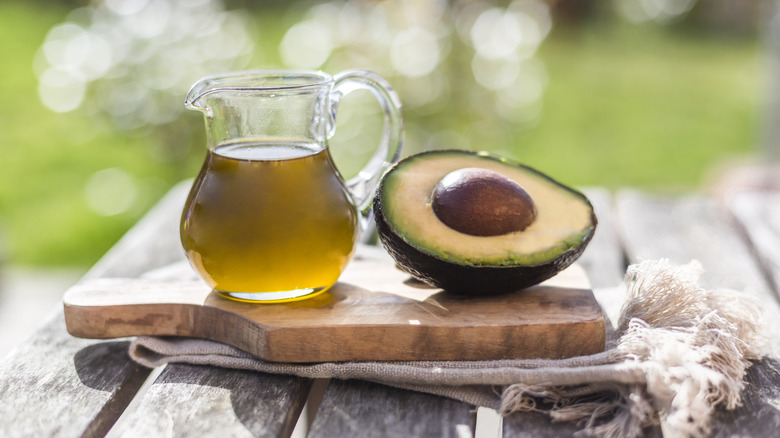
For years, home cooks have turned to butter, lard, and other animal fats to prevent food from sticking to pans. However, with growing concerns about calories and heart health, non-stick cookware and cooking sprays gained popularity as alternatives. Today, there’s a renewed appreciation for healthy fats derived from plant-based oils. Avocado oil stands out due to its exceptionally high smoke point, making it one of the safest oils for high-heat cooking. This means you can sear, sauté, or roast without worrying about harmful free radicals released by some oils at high temperatures (here are the cooking oils to use and avoid).
What makes avocado oil even more appealing is its healthy fats, offering nearly 10 grams of monounsaturated fats and about 2 grams of polyunsaturated fats per tablespoon. These fats play different yet complementary roles in supporting cardiovascular health. Monounsaturated fats can help lower “bad” LDL cholesterol and support cell health by aiding your body’s absorption of essential nutrients. According to a 2005 article in The Journal of Nutrition, polyunsaturated fats assist in moving cholesterol from your blood to your tissues and boost the activity of LDL receptors, aiding in clearing LDL cholesterol from your blood.
Avocado oil may reduce cholesterol

If avocado toast is your favorite, you likely already know that the avocado fruit is high in fat and low in sugar. However, keeping avocados at home can be challenging as they spoil quickly. Avocado oil offers those healthy fats without the worry of an impending expiration date.
A 2014 study in Disease Markers explored the effects of avocado oil on the cholesterol levels of laboratory animals. These animals were given a high-sugar diet to induce metabolic changes such as high cholesterol, triglycerides, and blood sugar. Their diets were then supplemented with avocado oil or olive oil. Avocado oil was as effective as olive oil in lowering LDL cholesterol and triglycerides without reducing HDL (“good”) cholesterol.
Avocado has also been shown to effectively reduce cholesterol in human studies. A 2023 systematic review in Cureus examined seven experiments focusing on adding avocado to the diet. When individuals included avocados in their diets, their total cholesterol and LDL cholesterol levels were lower compared to those following regular or low-fat diets. Although avocado didn’t enhance HDL cholesterol levels compared to regular diets, HDL levels were higher compared to individuals on a low-fat diet. However, adding avocados didn’t significantly impact triglycerides, blood sugar, or systolic blood pressure. (Here’s what else happens when you start eating more avocados.)
Avocado oil also supports whole-body health

In addition to the fatty acids in avocado oil, you’ll benefit from several other plant compounds that can enhance your health. According to a 2024 article in the Journal of Functional Foods, avocado oil contains phytosterols, which help lower cholesterol by reducing the amount your body absorbs from food and the cholesterol produced by your liver. It also provides potent antioxidants like phenolic compounds, tocopherols (a form of vitamin E), and carotenoids. These nutrients combat oxidative stress caused by free radicals, potentially safeguarding your blood vessels from damage associated with high blood pressure.
Avocado oil may also offer support for individuals with type 2 diabetes in several ways. It can help stimulate the release of hormones like GLP-1, which improve insulin response and aid in lowering blood sugar levels. Since diabetes can damage major organs over time, the antioxidants in avocado oil may help protect the heart, liver, and kidneys from harm. Avocado oil’s anti-inflammatory properties are an additional benefit due to the prevalence of chronic inflammation in many diseases. Avocado oil may help shield the brain and nerve cells from stress and damage, offering broad protective advantages for long-term health.




